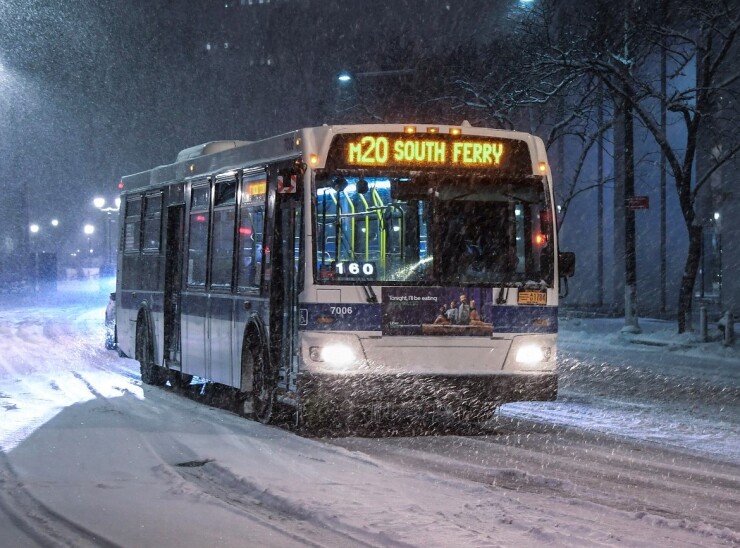Since March, the game plan for New York’s Metropolitan Transportation Authority has been primarily to borrow and seek help from Washington.
On Wednesday, the MTA’s board stuck to that COVID-19 strategy in passing a $17.1 billion
The budget vote was not for the fare and toll increases reflected in the budget. The authority is still holding public hearings on those.
The board also approved three bond resolutions, including the authorization of $2 billion to issue new-money bond anticipation notes and bonds to finance up to $2 billion of capital projects, and $500 million of new-money bonds and BANs to finance MTA Bridges & Tunnels capital projects.

“Federal funding provides our best shot at survival — and I use that word advisedly, 'survival,' ” Chairman Patrick Foye said at the monthly board meeting as the MTA also prepared for a storm of a different kind, the region's first heavy snowfall in two years.
The MTA has requested $12 billion in federal aid. Transit systems nationally are seeking $32 billion.
Foye cited more optimistic prospects of a federal rescue package, either during the lame-duck congressional session or when transit-favorable Democrat Joe Biden becomes president next month.
Variables include the balance of power in the U.S. Senate riding on two Jan. 5 special elections in Georgia.
“This issue should be above partisan politics,” Foye said. “This isn’t a bluff, this is real and the MTA is not alone. Systems across the country are facing the same hard choices.”
An assumed $4.5 billion of new federal aid will balance the 2021 budget, according to Chief Financial Officer Robert Foran. “But the deficits continue,” he said, warning of a $16 billion gap over four years despite internal cost-saving measures.
A variety of worst-case options are on the table if necessary, including deficit borrowing. Foran called the latter “almost a last resort because of its lingering, ongoing damage to the organization.”
The state-run authority, which operates mass transit in the New York City region, has been reeling from emergency restrictions designed to counter the coronavirus, with ridership dropping upward of 70%. The MTA is one of the largest municipal issuers with $45.5 billion of debt, including special credits.
A second wave of the pandemic also stands to cloud ridership returns.
Borrowing from the Federal Reserve’s Municipal Liquidity Facility’s short-term program will no longer be an option. The MLF expires on Dec. 31.
The MTA on Dec. 10 borrowed its remaining $2.9 billion available from the MLF in a
In August the MTA refinanced about $450 million of maturing BANs.
Only the MTA and Illinois, the lowest-rated state, used the Fed's program.
Borrowing through the Fed’s program is considered a private placement, which means the MTA was not required to issue an offering statement. It did so in August because it marketed the deal to municipal investors first.
“It's a slightly odd choice for the federal government to make,” said Nicole Gelinas, a senior fellow with the Manhattan Institute for Policy Research. “I guess we don't need to know for the moment any more about how broke the MTA is, but it does hurt transparency.”
The MTA has felt the sting from the capital markets. Its most recent in a rash of rating actions came from Fitch Ratings, which on Oct. 23 downgraded the authority’s transportation revenue bond anticipation notes to F2 from F1.
According to data on the Municipal Securities Rulemaking Board's EMMA website, a block of Series 2017B climate-certified transportation revenue refunding green bonds maturing in 2024 that originally priced at 121.098 cents on the dollar and a 1.83% yield, sold to a customer Wednesday at price of 109.394 cents and a 2.463% yield.
The MTA’s struggles also strain city credit. Municipal Market Analytics cited uncertainty over the MTA, and the related threats to New York's economic damage, as a notable risk along with the city’s reliance on real estate and its generous employee contracts.
The authority must also worry about a possible $600 million siphoning from New York State to balance its own general fund budget.

“Federal aid is not a license for the governor to raid at least $600 million of MTA funds,” said Rachael Fauss, senior research analyst for the good-government organization Reinvent Albany.
The board on Wednesday also approved a new pool of underwriting firms for its negotiated bond and note sales over three years.
Bank of America Securities, Goldman Sachs & Co., JPMorgan Securities, Jefferies, Ramirez & Co. and Siebert Williams Shank Co. will be senior managers.
In addition, the board also approved pools of 15 co-managers and 21 selling group members.
According to Finance Manager Patrick McCoy, a request for proposals issued on March 5 generated 42 proposals, including 21 that sought senior manager status.





